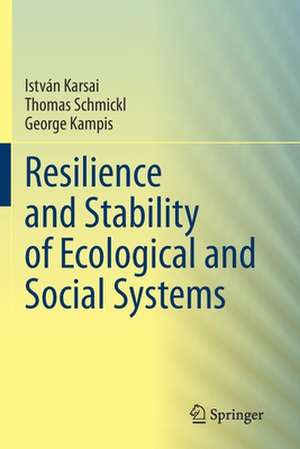Resilience and Stability of Ecological and Social Systems
Autor István Karsai, Thomas Schmickl, George Kampisen Limba Engleză Paperback – 22 oct 2021
| Toate formatele și edițiile | Preț | Express |
|---|---|---|
| Paperback (1) | 381.21 lei 6-8 săpt. | |
| Springer International Publishing – 22 oct 2021 | 381.21 lei 6-8 săpt. | |
| Hardback (1) | 388.52 lei 6-8 săpt. | |
| Springer International Publishing – 21 oct 2020 | 388.52 lei 6-8 săpt. |
Preț: 381.21 lei
Nou
Puncte Express: 572
Preț estimativ în valută:
72.94€ • 76.01$ • 60.40£
72.94€ • 76.01$ • 60.40£
Carte tipărită la comandă
Livrare economică 03-17 aprilie
Preluare comenzi: 021 569.72.76
Specificații
ISBN-13: 9783030545628
ISBN-10: 3030545628
Pagini: 157
Ilustrații: XVII, 157 p. 80 illus., 17 illus. in color.
Dimensiuni: 155 x 235 mm
Greutate: 0.25 kg
Ediția:1st ed. 2020
Editura: Springer International Publishing
Colecția Springer
Locul publicării:Cham, Switzerland
ISBN-10: 3030545628
Pagini: 157
Ilustrații: XVII, 157 p. 80 illus., 17 illus. in color.
Dimensiuni: 155 x 235 mm
Greutate: 0.25 kg
Ediția:1st ed. 2020
Editura: Springer International Publishing
Colecția Springer
Locul publicării:Cham, Switzerland
Cuprins
Understanding Ecosystem Stability and Resilience through Mathematical Modeling.- The importance of life history and population interactions in population growth.- Habitat fragmentation.- Forest fires: fire management and the power law.- Material flow, task partition and self-organization in wasp societies.- Ants and Bees: common stomach regulation provide stability for societies.- Generalization of the common stomach: integral control at the supra-individual level.- Modeling techniques.
Recenzii
“The book provides a good overview of the set of aspects that must be considered in order to understand ecosystem dynamics. This is important for predicting the future functioning of ecological and social systems.” (Fatima T. Adylova, zbMATH 1458.92002, 2021)
Textul de pe ultima copertă
This monograph, co-authored by three longtime collaborators, aims to promote the interdisciplinary field of mathematical biology by providing accessible new approaches to study natural systems. As there is currently scarce literature on the applications of mathematical modelling for biology research, this book presents a new way of studying interactions at the level of populations, societies, ecosystems, and biomes through open-sourced modeling platforms. It offers an interdisciplinary approach to analyzing natural phenomena—for example, by showing how master equations developed to describe electrical circuits can also describe biological systems mathematically. Ultimately it promotes a method of study based on modelling and mathematical principles, facilitating collaboration between mathematicians, biologists, engineers, and other researchers to enrich knowledge of the world’s ecosystems.
Caracteristici
Presents many different modeling and simulation techniques Provides real world bio-mathematical problems and examples Suitable for undergraduate students as well as engineers and researchers in biology, mathematics, and the social sciences
